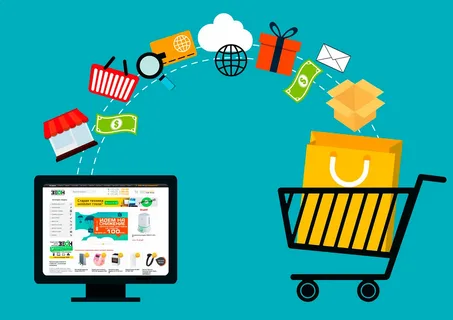E Commerce vs E Business In today’s digital world, two terms often pop up: e-commerce and e-business. While they may sound similar, they refer to different concepts. Understanding the difference between these two can help businesses grow and thrive online. In this blog post, we will explore what e-commerce and e-business mean, how they differ, and why these differences matter.
Table of Contents
ToggleWhat is E-Commerce
E-commerce, short for electronic commerce, refers specifically to buying and selling goods and services over the internet. When you think of e-commerce, picture online stores like Amazon or eBay. Here are some key points about e-commerce:
- Buying and Selling: E-commerce focuses on transactions where products or services are sold online. This includes physical goods (like clothes or electronics) and digital products (like e-books or software).
- Types of E-Commerce:
- B2C (Business to Consumer): This is when businesses sell directly to consumers, like when you buy a new phone from an online store.
- B2B (Business to Business): Here, businesses sell to other businesses. For example, a wholesaler might sell products to a retail store online.
- C2C (Consumer to Consumer): In this case, consumers sell to other consumers, often through platforms like eBay or Craigslist.
- C2B (Consumer to Business): This is when consumers sell products or services to businesses. For instance, a photographer selling their images to a company for marketing use.
- Transaction-Based: E-commerce is primarily about transactions. It includes the entire process of online shopping, from browsing products to payment processing.
What is E-Business
E-business, or electronic business, is a broader term that encompasses all aspects of running a business online. While e-commerce focuses specifically on buying and selling, e-business includes other activities as well. E Commerce vs E Business Here are some important points about e-business:
- Broader Scope: E-business includes e-commerce but also covers other functions like supply chain management, customer relationship management, and online marketing.
- Activities Involved:
- Internal Processes: E-business involves managing the internal processes of a company, such as inventory management and employee communication.
- Customer Interaction: It also includes interacting with customers through various channels, including social media and email marketing.
- Data Analysis: E-business often uses data analysis to improve decision-making and enhance customer experiences.
- Not Just Sales: While e-commerce is all about transactions, e-business can involve many other activities that help a business operate online.
Key Differences Between E-Commerce and E-Business
Now that we understand what e-commerce and e-business are, let’s look at how they differ:
- Focus:
- E-Commerce: Focuses solely on buying and selling products or services online.
- E-Business: Encompasses all online business activities, including e-commerce.
- Scope:
- E-Commerce: Limited to transactions.
- E-Business: Includes transactions and other business functions like marketing and customer service.
- Examples:
- E-Commerce: Online shopping websites, auction sites, and digital product sales.
- E-Business: Online businesses that manage inventory, customer relationships, and digital marketing.
- Revenue Generation:
- E-Commerce: Generates revenue directly through sales.
- E-Business: May generate revenue through various means, including sales, subscriptions, or advertising.
- Technology Use:
- E-Commerce: Relies heavily on payment processing systems and shopping cart technology.
- E-Business: Utilizes a broader range of technology, including CRM systems, ERP systems, and data analytics tools.
Why Understanding the Difference Matters
Understanding the difference between e-commerce and e-business is crucial for anyone looking to succeed in the digital marketplace. Here’s why:
- Strategic Planning: Knowing whether your focus is on e-commerce or e-business can help you plan your strategies effectively. If you’re running an online store, your priorities will be different from those of a company focused on broader business activities.
- Resource Allocation: Different activities require different resources. If you understand the distinction, you can allocate your time, money, and manpower more effectively.
- Marketing Strategy: Your marketing strategy will also vary. E-commerce might require more focus on promotions and discounts, while e-business might involve customer engagement through content marketing and social media.
- Customer Experience: Understanding what customers expect from e-commerce versus e-business can help you tailor your services to meet their needs. E Commerce vs E Business E-commerce customers want smooth transactions, while e-business customers might expect more engagement and support.
How to Succeed in E-Commerce and E-Business
Tips for E-Commerce Success
- User-Friendly Website: Ensure your website is easy to navigate. A clean, organized design can help customers find what they’re looking for quickly.
- Secure Payment Options: Provide multiple secure payment options to make transactions safe and convenient.
- Effective Marketing: Use online advertising, social media, and email marketing to attract customers. Promotions and discounts can also drive sales.
- Customer Support: Offer excellent customer service to build trust and encourage repeat business.
Tips for E-Business Success
- Integrate Systems: Use integrated software for inventory management, customer relationship management, and data analytics to streamline your operations.
- Focus on Engagement: Engage with your audience through social media, email newsletters, and valuable content to build strong relationships.
- Data-Driven Decisions: Use analytics to understand customer behavior and preferences, which can help you tailor your offerings.
- Adapt and Innovate: Stay updated with industry trends and be willing to adapt your strategies. Innovation is key in the ever-changing digital landscape.
Conclusion
In summary, while e-commerce and e-business may sound similar, they have distinct differences that are important to understand. E-commerce focuses on buying and selling goods and services online, while e-business encompasses all online business activities. Knowing these differences can help businesses strategize better, allocate resources efficiently, and enhance customer experiences.
If you want to delve deeper into this topic and learn more about e-business strategies, check out this article for additional insights.
Whether you’re just starting or looking to grow your online presence, understanding the nuances of e-commerce and e-business will set you on the path to success in the digital marketplace. Happy learning.




